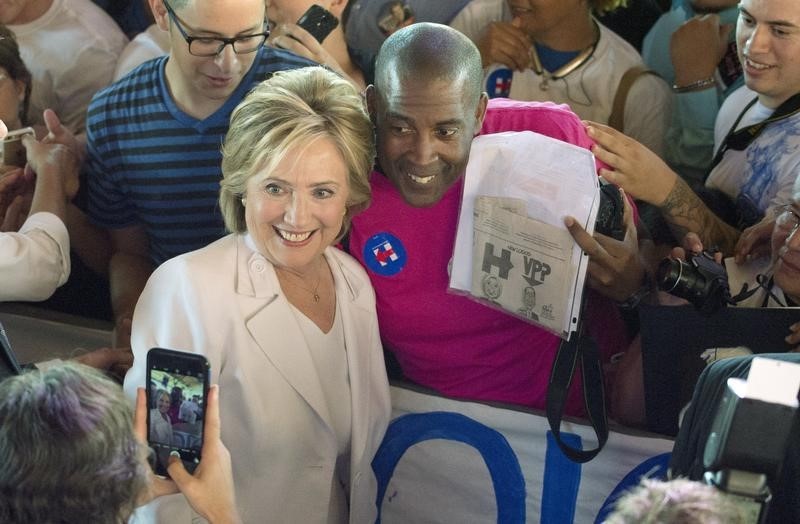By Ginger Gibson
DES MOINES, Iowa (Reuters) - Hillary Clinton spent $26 million over the summer building up her 2016 campaign, more than any of her rivals either within her own Democratic party or the Republican side, as she sought to build a formidable organization to help her capture the White House.
The former first lady and secretary of state who lost to Barack Obama in the 2008 campaign poured money into television advertising, the amassing of polling data and building a digital operation to reach as many voters as possible. Her biggest expense was the payroll for the 511 people her campaign employs, figures released Thursday show.
Clinton is attempting to strike a delicate balance. She's willing to spend the money to build an operation that no one else vying for the White House can compete with. At the same time, she wants to keep spending in check so that the campaign's budget doesn't spiral out of control.
It's a challenge rooted in her first run for the White House in 2008, when her campaign grew so large that she spent her way into debt and internal power struggles among her large staff exploded into the public view.
Campaign aides this time around have made a big splash about their frugal ways - top officials ride the bus instead of the train, staffers share rooms in low-budget hotels. Take for example her Des Moines, Iowa office - responsible for ensuring she wins the crucial first state. The three-room suite sits atop a hair salon. No two pieces of furniture match. Duct tape holds a sign up in the makeshift kitchen. And the curtains appear to be older than anyone working there.
But even if the campaign has been mindful of trimming costs, that doesn't mean they aren't spending money.
After Clinton, the two campaigns that spent the most during the quarter were those of Republicans Jeb Bush and Ben Carson. But their spending combined matched the spending her campaign racked up on its own during the three-month period.
Clinton's spending included $560,000 on private jets and she owes the charter company another $65,000 in billing that is still being processed. In that same time period, she spent more than $71,000 on office security. She spent more than $31,000 on licensing for music and other media. She spent just over $4,000 on sign-language interpreters.
BURN RATE
The expenditures came as she raised a hefty $28 million in the third quarter of this year and managed to build up a war chest of cash that her campaign has on hand for the coming months, according to fund-raising reports filed Thursday.
But Clinton's so-called "burn rate" - the pace at which her campaign spent money in the three months ending September 30 - was 86 percent, a number that far outpaced rivals like Bernie Sanders, who spent only 43 percent, or Republican Ted Cruz who spent 57 percent. Her burn rate was nearly identical to that of Republican Jeb Bush.
Having enough money in the bank became a significant problem for Clinton in 2008. She ran her campaign into $12 million in debt as she tried unsuccessfully to defeat Obama in the primary. Plus, she loaned her campaign $13 million more to keep it running.
When Clinton began to flounder in 2008, the large staff was plagued by infighting. The internal rifts went public and quickly defined her campaign.
Clinton's campaign officials say they are on the right track when it comes to fundraising. They point to the number of small dollar donors - 93 percent of donations in the previous quarter were less than $100. Clinton's aides also say the campaign remains on target to raise its goal of $100 million, a figure that is being used to craft the budget.
Her campaign argues that the large staff is an investment in infrastructure that will pay dividends later. The campaign has hired a data analytics team, which a campaign official said will be key to improving the ability to contact voters.
"We have put a premium on organizing and built a formidable team early," a campaign official said.

Between her existing sizable fundraising haul and personal wealth, it's unlikely Clinton's campaign will run out of money. But if campaign cash starts to become tight, such a large staff could become an albatross. Candidates are always loath to cut staff or scale back infrastructure for fear of creating an impression of a troubled campaign.